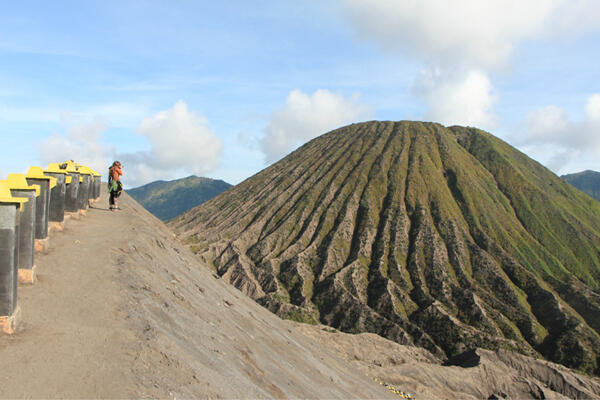Surabaya, Indonesia
Community-based Waste Management

Background Information
Strategic Plan for the years 2011-2015 regarding the Surabaya Garden and Cleanliness Department. Some of the programs improve the implementation of the 3R program (reduce, reuse, and recycle), community-based waste management, socialization of the use of waste and its treatment. They include:
•Cooperation with elements of society and society empowerment
•Socialization and elucidation on clean culture towards independent waste management
•Waste management competition in Surabaya
Goals of the Initiative
The goals of this project are mainly to:
•Reduce the volume of waste disposed of in landfill
•Empower the community
•Improve the quality of environment
Innovation for the Initiative
This project is considered revolutionary as no community-based waste management system has ever previously been applied, especially one that involves high community participation. Previously the burden lay on the city government alone to take care of cleanliness, yet since the implementation of this project, hundreds of thousands of people living in kampongs are also responsible for ‘greening’ the city starting from their respective neighborhoods. Also, many companies and NGOs are now actively involved in the project adding to the positive value created from this project through multi-stakeholder approach. Moreover, during the initial development of the initiative, Surabaya City Government was working closely with experts from Kitakyushu, Japan for know-how.
Outcomes and Assessments
•The significant reduction in volume of waste disposed of at landfill sites due to the success of village level waste treatment has contributed to prolonging the life span of landfill sites. In addition, treating waste from its sources has lessened the burden of landfill sites as they only treat residual waste.
•The dirty and hot kampongs have now turned green and clean and are frequently visited by people from various regions both from Indonesia and overseas as the destination to best learn about practices in waste management. They include the Republic of Korea (2010), Kitakyushu, University Malaya-Kuala Lumpur (2012), Laos (2012), World Bank & Bangladesh KIP PNPM (2012), Kyushu University (2012), Kobe University (2012). In other words, on a regional and international level, this initiative has inspired many regions to replicate similar methods for waste management.
•on a city level, this success has ignited Surabaya’s positive reputation on environmental program internationally, thus making it trusted to host many international seminars on environment such as Citynet Anniversary Celebration and International seminar on Environment (2012), APEC 2013, Informal Ministerial Meeting on Environment (2013), High Level Seminar on Environmental Sustainable Cities (2014), Regional 3R Forum (2014). In addition, Surabaya has also won several national and international awards in the environmental field, including Dubai International Award For Best Practices to Improves The Living Environment (2008), AdipuraKencana, Smart Environment byWarta Ekonomi (2011), Indonesia Green Region Award (2011), Best Park Management in Indonesia (2011), National Adiwiyata (eco-school award), ASEAN Environmentally Sustainable City (2011), CITYNET City to City Award (2012).
•Huge changes from this initiative are not only obvious physical changes of the environment, but also in public participation. People were formerly skeptical and unaware of environmental impacts. However, since the implementation of this project, the importance and benefits of cleaning their environment are increasingly understood and promoted, and many now eagerly participate in the program. This is proven by the increasing number of participants in the cleanliness competitions conducted by city government. Each kampong even created simple songs and unique outfits made of recycled materials to show the spirit of their environmental program, also making the event one rich in culture, progress and creativity.
•People’s innovation is also stimulated from this project. Where organic and inorganic waste was managed using the Takakura basket, many now create takakurabarrela and takakura boxes to meet their needs. They also modify the water treatment installation introduced by the city government according to budget and capacity they have. Therefore, we can find different types of installation in different kampongs.
•Economic benefits (society empowerment):
a)people can produce their own compost to fertilize plants which can then be sold to collectors;
b)water from the water treatment installation in kampongs is used for daily activities such as watering plants and washing motor cycles and thus saving excess expenditures on water.
c)the establishment of 180 active waste banks in Surabaya has brought considerable extra income for people selling inorganic waste to the banks. The turnover generated by the bank is ranges from one million to 72 million rupiah per month.
•Health benefits: according to data from Surabaya Health Department, the rate of diseases caused by bad environment is decreasing annually. They are including diarrhea from 70,446 cases in 2011 becomes only 42,244 in 2013; URI from 571,247 cases in 2012 into 340,691 in 2013; Dengue Fever from 3,739 cases in 2012 into only 1,827 in 2013.
•In the scope of international cooperation, the success in waste management has stimulated the development of cooperation with Kitakyushu in the environmental field by involving more parties creating a wider scope. This includes the establishment of Super Depo garbage treatment in cooperation with Nishihara Co. Ltd. as well as the development of a low carbon society.


 In Focus | World Cities Day: People-Centred Smart Cities
In Focus | World Cities Day: People-Centred Smart Cities City Stories | Fostering community resilience: A lifeline for the Central African Republic
City Stories | Fostering community resilience: A lifeline for the Central African Republic In Focus | Innovative Education, Empowering Futures
In Focus | Innovative Education, Empowering Futures




















 Tel: +86 020 3780 4434
Tel: +86 020 3780 4434 Email: info@guangzhouaward.org
Email: info@guangzhouaward.org Adress: Unit 01-7, 28th Floor, No. 7, Chunrong 3rd Road, Tianhe District, Guangzhou, Guangdong, 510000, PRC
Adress: Unit 01-7, 28th Floor, No. 7, Chunrong 3rd Road, Tianhe District, Guangzhou, Guangdong, 510000, PRC




